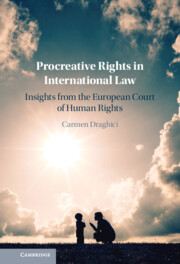Book contents
- Procreative Rights in International Law
- Procreative Rights in International Law
- Copyright page
- Dedication
- Contents
- Table of International Cases
- Table of International Instruments
- Introduction
- 1 Parenthood Aspirations and Justiciable Rights
- 2 A Right to a Genetically Related Child?
- 3 A Right to the Recognition of Intentional Parenthood?
- 4 A Right to a Healthy Child?
- 5 The Quest for Reproductive Equality
- Conclusions
- Select Bibliography
- Index
Conclusions
Published online by Cambridge University Press: 26 April 2024
- Procreative Rights in International Law
- Procreative Rights in International Law
- Copyright page
- Dedication
- Contents
- Table of International Cases
- Table of International Instruments
- Introduction
- 1 Parenthood Aspirations and Justiciable Rights
- 2 A Right to a Genetically Related Child?
- 3 A Right to the Recognition of Intentional Parenthood?
- 4 A Right to a Healthy Child?
- 5 The Quest for Reproductive Equality
- Conclusions
- Select Bibliography
- Index
Summary
The Conclusions put forward a first catalogue of procreative rights based on the claims successfully asserted in international case law to date. Obstacles to the development of procreative rights are also considered, from jurisdictional issues (such as the recognition of the subsidiary nature of international human rights law and States’ margin of appreciation in sensitive areas) to certain underlying assumptions in the judicial analysis (e.g. the importance of marriage as a foundation for intentional non-genetic parenthood). Finally, this closing chapter examines incipient and potential rights, that is, claims which have not yet been raised in international litigation (some currently pending in Strasbourg) or which were left to the discretion of national legislatures. Although many procreative rights are still aspirational in nature, it is suggested that the continuously evolving interpretation of the ECHR, aligning its requirements with medical advances and social perceptions, will eventually expand the scope of procreative autonomy in international law.
Keywords
- Type
- Chapter
- Information
- Procreative Rights in International LawInsights from the European Court of Human Rights, pp. 290 - 310Publisher: Cambridge University PressPrint publication year: 2024



